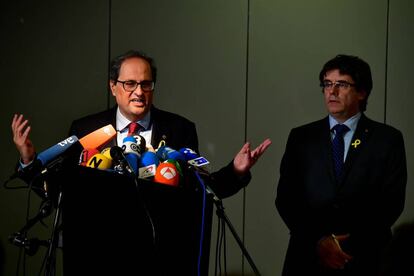New Catalan premier visits Puigdemont in Berlin, asks for end to direct rule
Spain’s two main parties renew their agreement to fight “challenges” by Catalan leader

The newly elected Catalan premier, Quim Torra, traveled to Berlin on Tuesday to meet with his predecessor, Carles Puigdemont, and show support for the ousted leader who led the breakaway bid until his removal by Madrid in late October.
In a joint press statement in the German capital, Torra said that he was there to “pay tribute” to Puigdemont. “We will never give up. We will not cease our efforts to invest President Puigdemont with office,” said Torra, who has openly described his own presidency as transitional. “I see myself as a custodian-president,” insisted Torra on Tuesday.
I don’t agree with Rajoy’s idea of running out of Catalonia
Ciudadanos leader Albert Rivera
Considered a hard-line separatist, Torra was elected on Monday in a 66-to-65 vote in a second round of voting inside the Catalan parliament. A little-known figure in politics, he was personally selected by Puigdemont to be the next nominee after his own bid to be appointed in absentia failed. Failure to find a new leader by May 22 would have resulted in new elections.
“I have no doubts that you will be a very responsible president of Catalonia,” said Puigdemont, who is awaiting a decision by a German court on whether to extradite him to Spain to face trial for rebellion and misuse of public funds over the unilateral breakaway bid.
Torra, who has been criticized for past public statements that have been described as xenophobic, said he was open to dialogue with Spain. “We will do everything in our power to initiate a frank and open dialogue with the Spanish government,” he said.
Extend current powers
Albert Rivera, the leader of Ciudadanos, whose support is crucial to Rajoy’s minority government, wants the current emergency powers to be extended beyond the formation of a new Catalan government, and even expanded to include control over Catalan public media outlets.
"I don't agree with Rajoy's idea of running out of Catalonia," said Rivera, whose party is leading voter intention polls at the national level, and also won the largest share of the vote (25%) at the Catalan elections of December 21 on a unionist message. "I think that with a racist president who says he is going to set up the Catalan republic, all that is left for us is to enforce the Constitution."
Rivera will meet with Rajoy on Thursday to review the situation and discuss the next steps. Under the terms of the current measures approved by the Senate, direct rule should be lifted after the members of the new Catalan government are sworn in.
He also urged Madrid to lift the emergency powers in place since late October under Article 155 of the Spanish Constitution, and to end control over the region’s finances, which have been monitored since before the unconstitutional referendum of October 1.
Joint fight against illegal moves
His statements come on the same day that Spain’s two main parties renewed their pledge to work together to fight any potential illegal moves by the new Catalan government.
Prime Minister Mariano Rajoy met with opposition leader Pedro Sánchez, of the Spanish Socialists (PSOE), and both men said in a statement that they will work together to address “any challenges” presented by the new regional government.
The statement criticized “the xenophobic nature of Torra’s public statements” and “confrontational” rhetoric. It added that the PSOE will support Rajoy’s Popular Party (PP) to stop any attempt by the Catalan regional government to form parallel political structures outside of the law. The leaders described the agreement as a “proportional response in the defense of constitutional legality.”
The PSOE backs the government’s decision to keep monitoring the region’s finances to ensure the budget is “used to meet objectives of general interest” and not to fund the independence movement. The Finance Ministry has been overseeing the region’s finances since before Rajoy activated emergency powers under Article 155 of the Spanish Constitution in response to the unilateral declaration of independence.
The statement criticized “the xenophobic nature of Torra’s public statements”
The PSOE also said it will support the reapplication of direct rule under Article 155 if the Catalan regional government breaches the law. “It will be less difficult the second time around,” noted PSOE organization secretary José Luis Ábalos. “Collaborating or ratifying a constitutional response will not represent any effort.”
“The debate is not whether Article 155 needs to be applied or not, that's an old debate. The answer is yes. The question is: what Article 155?”, said Sánchez, suggesting that any new emergency powers would be “of a different nature” than the ones currently in place.
Tu suscripción se está usando en otro dispositivo
¿Quieres añadir otro usuario a tu suscripción?
Si continúas leyendo en este dispositivo, no se podrá leer en el otro.
FlechaTu suscripción se está usando en otro dispositivo y solo puedes acceder a EL PAÍS desde un dispositivo a la vez.
Si quieres compartir tu cuenta, cambia tu suscripción a la modalidad Premium, así podrás añadir otro usuario. Cada uno accederá con su propia cuenta de email, lo que os permitirá personalizar vuestra experiencia en EL PAÍS.
¿Tienes una suscripción de empresa? Accede aquí para contratar más cuentas.
En el caso de no saber quién está usando tu cuenta, te recomendamos cambiar tu contraseña aquí.
Si decides continuar compartiendo tu cuenta, este mensaje se mostrará en tu dispositivo y en el de la otra persona que está usando tu cuenta de forma indefinida, afectando a tu experiencia de lectura. Puedes consultar aquí los términos y condiciones de la suscripción digital.








































